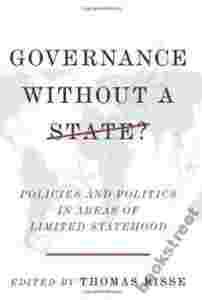|
Governance discourse centers on an "ideal type" of
modern statehood that exhibits full internal and
external sovereignty and a legitimate monopoly on the
use of force. Yet modern statehood is an anomaly, both
historically and within the contemporary international
system, while the condition of "limited statehood,"
wherein countries lack the capacity to implement central
decisions and monopolize force, is the norm. Limited
statehood, argue the authors in this provocative
collection, is in fact a fundamental form of governance,
immune to the forces of economic and political
modernization. Challenging common assumptions about
sovereign states and the evolution of modern statehood,
particularly the dominant paradigms supported by
international relations theorists, development agencies,
and international organizations, this volume explores
strategies for effective and legitimate governance
within a framework of weak and ineffective state
institutions. Approaching the problem from the
perspectives of political science, history, and law,
contributors explore the factors that contribute to
successful governance under conditions of limited
statehood. These include the involvement of nonstate
actors and nonhierarchical modes of political influence.
Empirical chapters analyze security governance by
nonstate actors, the contribution of public-private
partnerships to promote the United Nations Millennium
Goals, the role of business in environmental governance,
and the problems of Western state-building efforts,
among other issues. Recognizing these forms of
governance as legitimate, the contributors clarify the
complexities of a system the developed world must
negotiate in the coming century.
|
|

